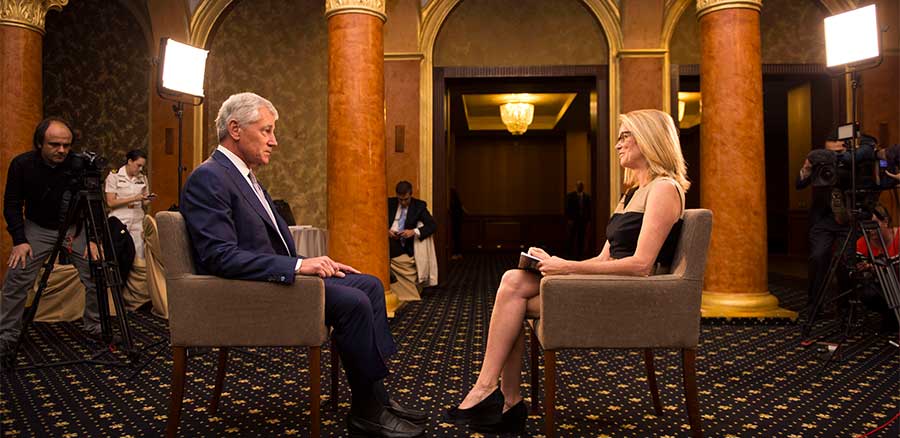
Creative Commons image credit: US Department of Defense
Here are some documentary filmmaking interview tips. Some are obvious, others not so much. Not all of these will be appropriate for every documentary film. You may also want to consider: Documentary Film Interviews: Should the Questions be Heard on Screen?
Documentary Filmmaking Tips:
1. Explain to your interviewee that you may ask similar questions or you may ask repetitive questions, it just helps to have answers worded differently so you have a choice when editing. Preparing your interviewee will help them understand.
2. Keep your questions brief! Often times beginning documentary filmmakers will ask long winded questions that are more about proving they know a lot about the subject matter than getting real answers. Although there’s a cliche in documentary filmmaking that an interview is “just a conversation,” the truth is it should be a conversation where the interviewee is doing 90% of the talking– not just 50%.
3. Stay silent when you think the interviewee is done answering a question. People instinctively want to fill silence especially in uncomfortable situations so they tend to talk a bit more. You can use this human nature to your advantage. If we had a dime for each time that an interviewee finished talking, paused, only to say something truly insightful just because we paused before asking our next question, we’d have a lot of dimes.
4. Act stupider than you really are about the interview subject. If you prove your knowledge too much, the interviewee will unconsciously feel that they don’t have to explain a lot to you and so their answers will be more as if they were talking to an expert in their field rather than a general audience. But your audience for your documentary film (most of the time) won’t be subject matter experts that have done four months of pre-production and research. So act dumb. Speaking of that…
5. Get something wrong in your questions. This is a neat trick if you can swallow your ego for long enough to do it. There’s an old adage on the internet that the quickest way to figure out how to do something is by going online and posting in a forum and giving incorrect instructions on how to do whatever the task is. All of a sudden you’ll get dozens of people tripping over themselves to correct you. In the same way, if you give your interviewee something to “fight” against or a straw man, it can result in a much more passionate answer from them.
6. Start with small questions, end with big ones. When you’re asking an interviewee the really big questions like asking them to reflect on their experience with the subject matter, or what it all means, or what they’ve learned or how they’ve changed (if it’s a character based film), it’s best to save those questions for the end of the interview. Especially in circumstances where you’re asking a subject to remember events from many years ago, it helps to have them freshly thinking about the relevant matter, and then ask them to summarize their feelings or thoughts at the very end.
7. Only ask one question at a time. You’d be surprised how many beginning documentary filmmakers don’t do this. If you ask more than one question, expect only the last question you ask to be the one that the interviewee actually answers.
8. If you’re struggling to get detailed answers from your subject, ask them to back up and “tell you the story of when…” When people feel like someone wants to hear “a story” they’re more likely to give richer details. Similarly, asking an interviewee to “Paint a picture for me of that moment…” can also achieve great results.
9. “What’s the best/worst case scenario for how this will all turn out?” Films that take place in the modern day as the events are unfolding need stakes. So asking your characters to day dream or speculate can help establish those stakes.
10. “Why?” Never be shy about asking the additional “Why” question at the end of one of your interviewees answers. Even if you already think you know what they’re going to say.
Related Articles
Documentary Film Interview Lighting Kits
Best Cameras for Documentary Film
Documentary Film Shotgun Microphones
Must Have Documentary Filmmaking Accessories